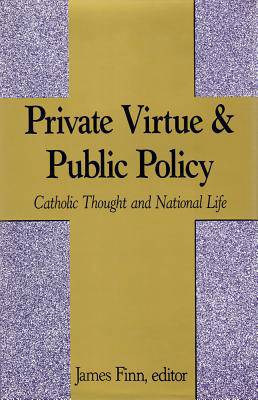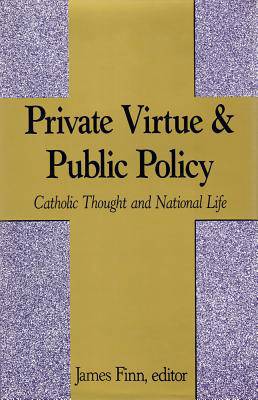
- Retrait gratuit dans votre magasin Club
- 7.000.000 titres dans notre catalogue
- Payer en toute sécurité
- Toujours un magasin près de chez vous
- Retrait gratuit dans votre magasin Club
- 7.000.0000 titres dans notre catalogue
- Payer en toute sécurité
- Toujours un magasin près de chez vous
Private Virtue and Public Policy
Catholic Thought and National Life
James Finn
Livre relié | Anglais
195,45 €
+ 390 points
Description
Private virtue is a major factor in forming public policies, including those that affect the material well-being of citizens. This is a central thesis of Catholic social thought, but it is not a parochial view. As this affluent nation grapples with resistant social issues of all kinds-drugs, homelessness, poverty, the consequences of sexual permissiveness, inadequate education, and the breakdown of families-it is becoming increasingly evident that the need for private virtue is a central fact of our political and social life. In this respect, Catholic social thought and the American experience are mutually supportive.This volume examines the implications of this statement. In a sense, it is the next step in the dialogue and debate initiated by the Catholic bishops in the United States over a period of years in the mid-eighties. The pastoral letter that resulted from their deliberatons asked how the economic life of the United States could best serve the material and spiritual well-being of people, both those in the United States and those in other countries. It also proposed some answers. Even before the bishops released their statement, the Lay Commission on Catholic Social teaching and the U.S. Economy joined the debate with its own lay letter, which both overlaps and differs in significant respects from the bishops' statement. This volume, which is initiated by the Lay Commission, takes the debate even further.Various experts discuss the relationship between public policies and private, virtue and examine specific aspects of economic life. Among these are: the meaning of "economic rights," what to do about Third World debt, economic justice and the family, and certain macroeconomic issues. Their view is independent, authoritative, clearly articulated, and inevitably they will be controversial. They also enrich and further the ongoing dialogue on how best to make the economy serve the people, and in particular the most deprived.Contributors include William E. Simon and Michael Novak, chairman and vice-chairman of the Lay Commission, J. Brian Benestad, Allan Carlson, J. Peter Grace, Howard J. Wiarda, John P. Cullity, James Q. Wilson, and the editor of this volume James Finn.
Spécifications
Parties prenantes
- Auteur(s) :
- Editeur:
Contenu
- Nombre de pages :
- 151
- Langue:
- Anglais
Caractéristiques
- EAN:
- 9780887383069
- Date de parution :
- 30-01-90
- Format:
- Livre relié
- Format numérique:
- Genaaid
- Poids :
- 408 g

Les avis
Nous publions uniquement les avis qui respectent les conditions requises. Consultez nos conditions pour les avis.






